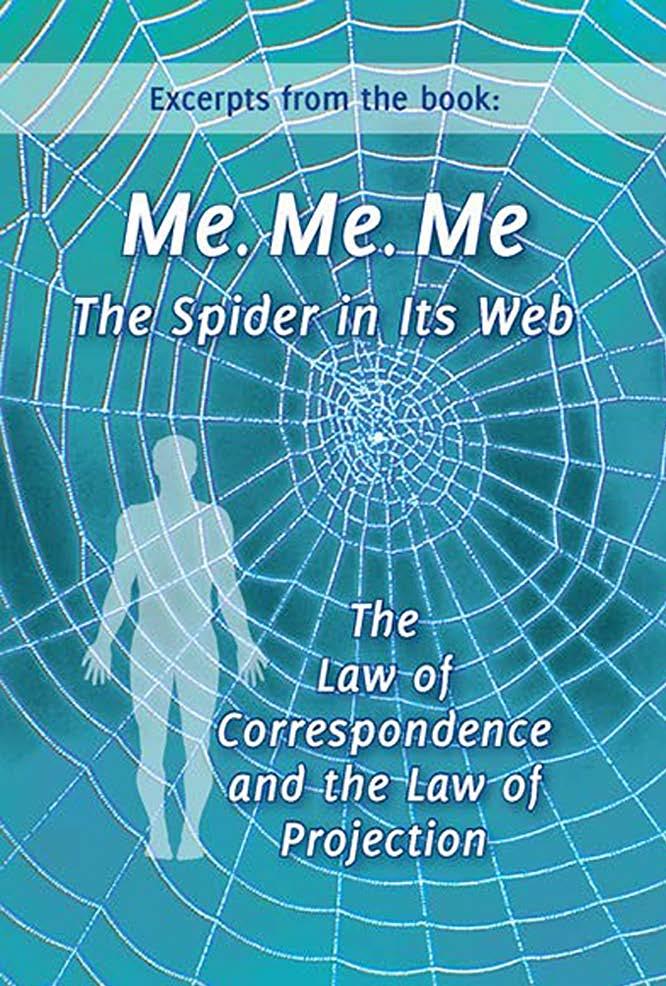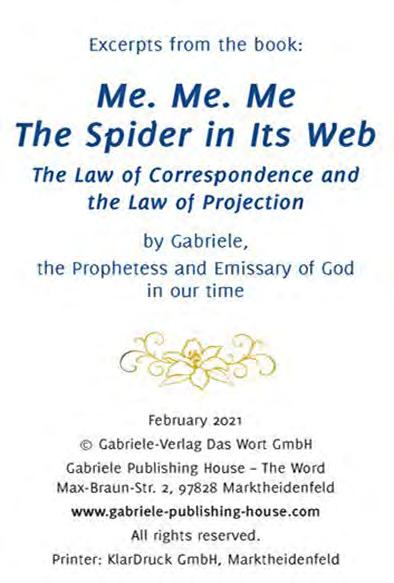






The law of correspondence of one person is not the law of correspondence of another. Everyone feels, thinks, speaks and acts according to his specific laws of perception and of correspondence, according to his own state of consciousness. This is what he works with and what he uses to influence others in many ways, in order to project his correspondence, his opinion, into them. The projections of correspondences from one person into another often take place with cunning and trickery or with purposeful pressure, so that the other accept the correspondence – the opinion – of the one. ...
Every person is an extensive memory bank, which is connected with the causal memory bank of the material cosmos and with that of the purification planes, through his personal, human, that is, earthly and sinful, inputs. But
also as human beings we are and will always be the child of God. The heart of every soul in a human being is the incorruptible core of being, God, which links soul and person with the eternal Being, the eternal law. Via this core of being, God, all that is pure is in communication with the pure. The impure of each individual, his sinfulness, communicates, in turn, with the sinfulness that is stored in his soul and in the causal network of interconnections. Based on the principle “like attracts like,” the pure communicates with the pure and the impure with the impure.
The human being can be compared to a computer. It is known that a computer can print out only what has been fed into it, that is, what has been stored in it. It is similar with the computer “human being.” A person can express only what he has entered into himself, that is, what is stored in him. With a technical computer, one does not speak of correspondences, because it prints out, unaltered, the data that has been entered into it,
unless there is a so-called virus in the computer system, through which false information can develop or programs can even be corrupted.
The computer “human being,” who has programed himself, has more possibilities to express himself than does a technical computer. He is able to mix parts of his programs. Thus, the computer system “human being” can be compared to a mixing board: The mixed programs – tools of the human art of display and of the art of covering up and of deceit – often consist of embellished words and actions. ...
Thus, the individual can color and gloss over his correspondences, his emotions like anger, hate, envy, as well as his opinions, conceptions and intentions. This means that with cunning, he purposefully makes them more palatable to his neighbor, so that the latter take in this mixture, letting himself be programmed, and thus influenced and manipulated. ...
The mixing board of programs developed because the person thinks other than he
senses and feels, and speaks other than he thinks and feels, but also acts other than he speaks, thinks, senses and feels. Countless variations are possible from his colorful repertoire of feelings, sensations, thoughts, words and actions. Depending on his momentary intentions, the person puts together the corresponding combination for his way of speaking or acting. ....
The correspondence programs of a person can be compared to tools like a chisel or a paintbrush. Just as a sculptor chips out a sculpture from a stone, so is the form of a person’s body shaped by his feeling and thinking. Just as the paintbrush or pencil of an artist draws a picture stroke by stroke, so does a person draw his physical body with his correspondences, with his human way of feeling, thinking, speaking and acting. This happens at every moment, because we feel, sense, think, speak and act at every moment. As a result of this, our radiation changes minute by minute. We are what goes out from us. With this, the individual
shapes his life and his surroundings – and as he is, he has a direct or indirect effect on his neighbor. ...
Our stored correspondences, our sins, are the engravings on our physical body. We either bear the light of our soul or we display the shadows of our soul, the sins. Each one of us is the identification card of his inner being, of what corresponds to him, what he himself has input. That is our character. If we allow second, third or fourth persons to insinuate into us their concepts and desires, if we take in the projections of our neighbor, this is possible only because similar aspects are already stored in our soul or in our subconscious or consciousness. These already existing engravings form the basis, the magnets, so to speak, which attract the same and like things. We could also express it in the following way: The seed of the one falls onto the fertile soil of the other.
If we think about these brief explanations in all their consequences, many will surely say, “This is outrageous,” or even, “This is eerie.” Both apply, because based on the principle of “sending and receiving,” many things are possible. Through the projections which we allow others to instill in us or which are transferred to us through telepathy, because we have the same or like correspondences in us, we adopt a part of the character of others, to whom, for example, we are servile. We let ourselves be programmed and manipulated. The web of the spider is its world. Like a spider, we people spin our web, the web of our correspondences, of our programs. This is what we live in; it is our ego world and we are trapped in it – and through the threads of our projections we are also tied to the network of our neighbor.
But the principle of “sending and receiving” is also effective in the positive sense. If we send out positive, peaceful, unifying thoughts, then these also pass on their inherent message. For example, they can be picked up by a person who is considering the pos -
sibility of committing murder. Our positive “flying” thoughts may find entry into the considerations of “for and against” of the negative thinker. The scale of his heart is tipped by the positive energies of our thoughts; the waves of his hatred are calmed; his reason and conscience gain the upper hand. If we can thus prevent our fellow person –whom we don’t even know – from committing a terrible act – without our or his being aware of it – we become the liberator and unknown friend of the one who refrained from committing the deed and whose life may now turn toward the good. ...
M any will wonder “How can I protect myself against the influences, against the projections of others or even against telepathic transfers?”
There is only one protection: Learn to know yourself, your behavior, your character, which consists of your personal feelings, sensations, thoughts, words and actions. With the help of the Christ of God, clear up daily the sinfulness that today shows you, and do not
commit this sin anymore. In this way, you attain steadfastness in Christ and will no longer let yourself be influenced by the desires, passions, opinions and conceptions of your fellow human being.
Once we have found our hold in the divine Self, we will no longer lean on anyone or imitate others.
If we change ourselves in this way, then our character changes, and with this, the appearance of our body, too. And so, many who are bent over begin to straighten up when they turn to the positive powers. Many a wrinkle disappears when a person begins to feel and think in a positive way more and more, when he affirms the positive powers in everyone and in everything and sets out to unfold them. ...
Each one of us wants to be understood and accepted by others. Each one of us wants our neighbor to think positively and favorably of us. So, let us first practice goodwill ourselves! This does not mean that we should flatter our neighbor, but that we
should affirm the good in him, for the good is found in every person, since God, the allknowing love and wisdom, is in the soul of every person and in every cell of their physical body, too. If we practice being in unity with our fellow people instead of separating ourselves from them, we will become kinder, more understanding and of good will. Understanding, good will and kindness enable us to see and understand our neighbor in the right way.
Let us also practice freedom by no longer binding our neighbor to ourselves through our projections when we want to win him over to our desires or our way of thinking. ...
By changing toward the good, we learn to look deeper. People can blind and deceive us only as long as we blind and deceive ourselves. Once we have developed an upright character, we are often able to look into the hidden aspects of our fellow people and to see them as they really are. We may well see the faults and weaknesses of our fellow people, but we do not judge or condemn.
We can read on every person what he really is. The markings of an individual are formed in manifold ways, depending on his positive and negative programs. We change ourselves every day, every hour anew, according to our patterns of behavior. We move and behave according to our markings. Nothing happens by chance. The whole person draws his own markings from the top of his head to the soles of his feet. Down to the tiniest details, the smallest dimples and wrinkles, everything was entered by the individual himself into his soul and into his genes. ...
W hat would we say if one of our acquaintances were to claim that one seed could sprout for another seed and bear its fruit? We would say that this is nonsense and out of the question. For anyone it is totally clear that no seed can sprout for another seed and bear its fruit. But we can sow some of our own bad seed into someone else’s soil, if the ground has been prepared for this. However, if someone then says that a
person who has influenced another is guilty of the other’s fate, then the one who claims this, gets nothing but a pitying smile, because many are of the opinion that they carry no blame for the illness, misery and fate of their neighbor. They believe that they have never done anything to anyone.
Is this really so? Let us ask ourselves: Were we and are we always pure in our thoughts toward our fellow man?
Were and are our thoughts and words sensitive toward our neighbor?
Do we influence no one, determining that he should do this or that for us, even though we could do it ourselves?
Did and do we not put pressure on certain people to fulfill our will even though they do not want to?
How often have we disparaged some of our neighbors as stupid, dumb or incompetent –toward third parties or in our thoughts?
Have we never hated anyone or envied someone for this or that? Have we never spoken hypocritically?
Have we never quarreled or lived in enmity with others?
Have we never disparaged one of our fellow people and perhaps subjugated many a one? Have we contained our jealousy toward our fellow people?
Have we never seemed to speak positively while we were thinking negatively, that is, were we never hypocritical? How often were we indifferent toward our neighbor?
Our reader may say: “Who doesn’t do these things?” That’s true! No one is perfect, but each one of us knows about the commandments of God that say: You should love your neighbor, that is, not wish them something unpleasant or bad, not even in your thoughts. ...
The law of God consists of the seven basic powers, Order, Will, Wisdom, Earnestness, Patience—which is kindness—Love and Mercy—which is gentleness. The egotistical law that each individual personally created and still creates consists of
disorder, self-will, intellectual striving, carelessness, impatience, self-love – which is selfishness – and mercilessness, which is pitilessness.
The seven divine basic powers, the law of God, were reversed with the turning away of the Fall-beings and the continuous sinning of human beings, and became the seven egotistical forces of creation, which are the human ego. With these seven egotistical forces, every person creates their sins and their share in the global karma, the worldguilt. This is this egotistical heritage. The individual inputs are the human character, the personal aspects of each individual; these cannot be relegated to others. This, our individual law, is our work volume. We draw from it and with it, we affect our neighbor and our environment.
We can see our correspondences as a workbench, on which we chisel and hammer out more programs, like, for instance, the programs of cunning and trickery, with which to gain our own advantage. ...
W hat a person does to his neighbor, including by projection, falls back on him. What a person does to the kingdoms of nature, likewise falls back on him. Therefore, whatever a person does to other life forms, he does to himself.
Jesus taught according to the following: “What you do to the least of My brothers, you have done unto Me.” The animal brothers and sisters are our second neighbors. They, too, sense and feel pain and suffering. For us, this means that whatever we do to the nature kingdoms, we do to the eternal laws of creation, God, and that will again fall back on us.
Everything that goes out from us, light or shadow, the divine or sinful – both come back into us. Light or shadow, then, is what we, ourselves, are. Whatever we send out is what we receive, and that is also what we are; it marks our character, and our character, in turn, marks our body. If a person strives for high spiritual ethics, for the actualization of the Commandments of God and of the teachings of Jesus in the Sermon on
the Mount, then he refines his senses, thus ennobling the world of his feelings, sensations and thoughts, as well as his words and actions. His external appearance becomes upright and noble, his frame of mind, good. He enters into communication with the divine Being, the law of God, more and more. The inner harmony, the peace of a person who has found the divine in himself, and has thus found himself, shows on his shell, the person, and in what surrounds him. ...
Since God dwells in every person, each person has in himself the help and power of the Christ of God to transform his correspondences, that is, his sinfulness, so that from his individualistic law, his ego-law, he find his way into the law of God. Therefore, every person is called to put the seven basic powers of God – which each individual has reversed in his own way – right again: from disorder to Order, from self-will to the Will of God, from intellectual striving to divine Wisdom, from carelessness to Earnestness, from impatience to Patience, from self-
love, which is selfishness, to Love for God, from mercilessness, which is pitilessness, to Mercy.

